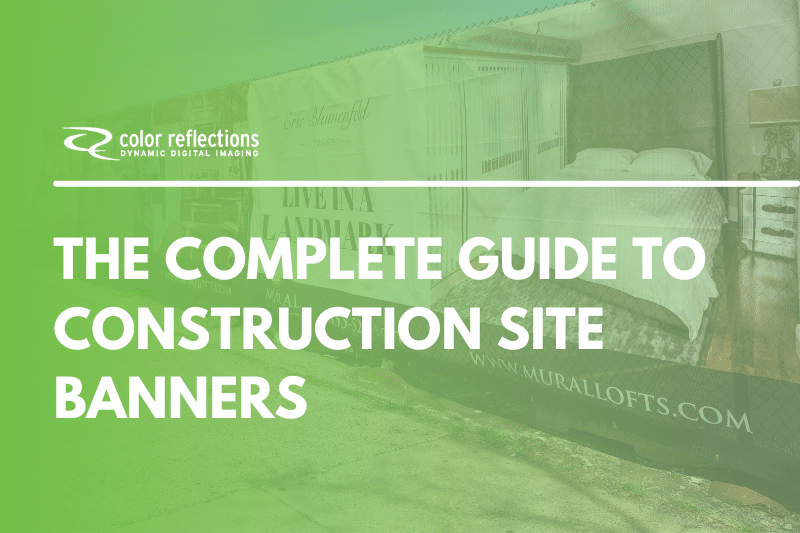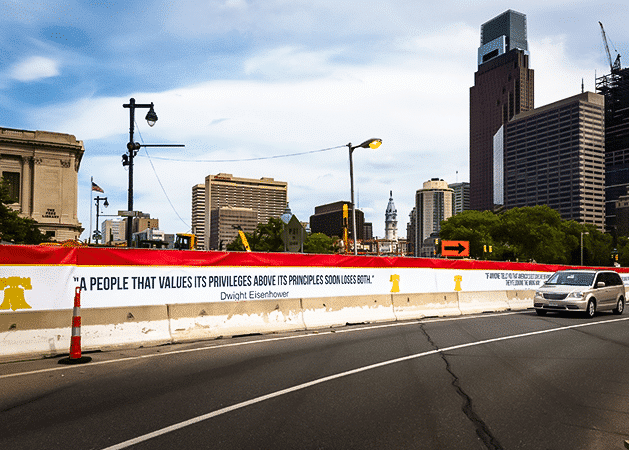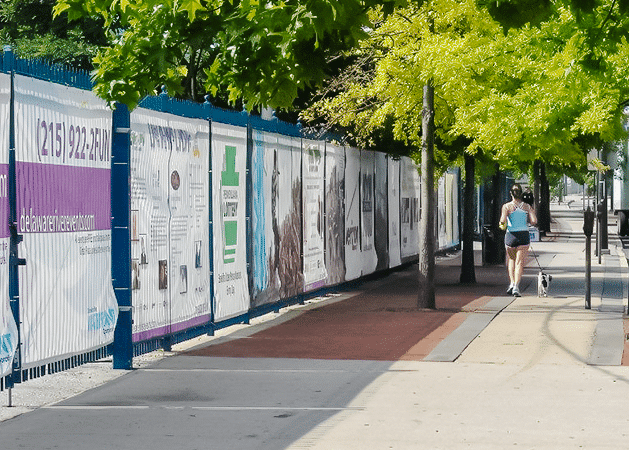The Complete Guide To Construction Site Banners

Construction site signage conveys essential information about safety, directions for getting around a job site, and provides a visual barrier from prying eyes depending on the size and placement. But did you know they can also be a powerful branding tool?
These multi-purpose signs are typically large format banners used to promote businesses and upcoming events or even get people excited about what’s under construction. Whether you’re a builder, architect, or advertising looking to generate new leads, we’ve compiled a complete guide to construction site banners
All signs are visual signals for information, navigation, safety, regulation, and advertising. Construction signs are normally put in place to communicate vital details to drivers, pedestrians, and workers in and around the job site. The Occupational Safety and Health Administration (OSHA) also has specific requirements for the type of information, size, and placement of construction signage that must be followed. Jobsite-specific signs in particular, range in size, material, and type of messaging based on the needs and placement.
Construction Safety Signage
Construction safety is priority number one on every job site. Safety signage protects the worker and visitors in and around the job site. Construction warning signs for road traffic may vary in shape, size, and graphic messaging. Construction sites near pedestrian traffic can include floor or ground decals, large format banners, fence banners, and more. They are typically yellow, orange, or red with bold lettering.
Construction Directional Signage
Detours are frustrating—even for those on foot. The proper directional or wayfinding signage can alleviate stress for drivers and pedestrians. Because these signs help guide people around the construction site and may indicate where entrances, exits, and other vital areas are located, they should have bold fonts, bright colors, and be easy to read.
Construction Informational Signage
Informational signs convey many messages. They may be prohibitive or regulatory regarding smoking, eating, drinking, or do’s and don’ts of the job site. They can include emergency information like emergency exits, assembly points, and contact numbers. Work-in-progress indicators, scheduled completion dates, and even details about the construction project itself are included in job site signage. These signs should have fonts that are also easy to read, structured spacing, and contrasting colors so the message stands out.
Construction ADA-Compliant & Tactile Signage
Depending on the location and project, some constructions signs may need to be ADA compliant. Tactile signage has braille, a language or code made of dots read by touch. Tactile signs may include raised text to symbols also read by feeling the sign. There are specific ADA guidelines builders, contractors, and job site managers must follow when designing and placing these signs.
Construction Fence Advertising
Here’s where you can get creative with your construction signage. Whether for job site privacy or custom messaging, construction banners are a cost-effective way to reach a specific audience because they are highly visible. Also, custom-printed construction fence advertising is sometimes cheaper than tv or radio ads.
Even if your target audience isn’t found near the construction site, the size of the banners can attract attention, get people talking, or end up on social media (free advertising!). You still want them to be readable, so prioritize bold fonts and colors, but you can include imagery and other infographic branding materials.
Before you customize the graphics and messaging for your construction signs, you must pick a material. The type of material may dictate the design for your banner graphics and branding ideas. These are the most common materials used for outdoor construction fences or barricade signs.
- Corrugated Plastic Signage – Also known as coroplast, corrugated plastic is often used for temporary signs. This lightweight and durable material is typically used for directional and event signs, making them a good option for pedestrian traffic.
- Aluminum Signage – Typically reserved for smaller safety or regulation signage, aluminum is rigid, durable, and perfect for long-term outdoor construction signage.
- Fabric Signage – Made from polyester, lightweight, durable, and eco-friendly, job site fabric banners are great for branding materials that need to be reused again and again. They are easy to clean, store, and transport.
- Vinyl Signage – Vinyl banners and signs are one of the most popular types of construction signage. They are durable, weather resistant, easy to install, and can be cut or custom-designed to fit any space on a job site.
- Mesh Signage – Mesh banners are a go-to choice for construction fence advertising. Weather resistant and made of 70% vinyl material, small holes allow wind to pass through, reducing the risk of damage to the fence while providing ample space for brand messaging.

Placement is another key element of construction sign design. The majority of construction signage is outdoor. The rule of thumb for all job site signs is to place notices at the beginning and end of the construction zone and at regular intervals throughout the area to alert people to hazards depending on the type of construction.
Fences and barricades, for example, keep uninvited people and vehicles from entering the construction site, provide privacy, and act as a theft deterrent. While you have various options for small-sized signs, three main types of large-format construction signage are used for most messaging.
Construction Fence Signs
Construction fence signs, or fence wraps, are attached to temporary fencing surrounding the job site. These are typical for retail, apartment, corporate, or other public. Not only are they informational or directional, but they often have customized brand messaging that promotes the companies involved in the project, advertises “coming soon” aspect of the project, or can be sold as space to sponsors or other advertisers.
Mesh is one of the more popular materials, as fences allow for airflow. To help further cut costs, mesh banners can be cleaned, stored, and reused on future construction sites.
Construction Barricade Signs
Some job sites, especially those that involve road work or projects near roads, use temporary barricades to protect those inside and prevent those nearby from entering the job site. Construction barricade signs are attached to temporary barriers that block off an area within or around the construction project. These signs can be larger and longer in length compared with some construction fence signage.
Typical materials include vinyl, mesh, and sometimes fabric depending on where the barricades are placed. They can also be made of corrugated plastic that acts as the barrier itself rather than being attached to a barricade.

Construction Decal or Ground Signs
Typically reserved for areas with heavy pedestrian traffic rather than roads, construction ground signage is best used for directional information. Think amusement parts, indoor malls, and outdoor event areas. Unlike other types of signs, ground and floor graphics do not usually adhere to the required messaging, size, and placement guidelines. So you can be very creative with informational or directional details and branding ideas. Most ground or floor decals are made from durable, non-slip vinyl with an adhesive backing.
Regardless of placement, material, and type, construction signage has many benefits. Companies can use them to protect their workers and the public, as well as inform, promote, and increase the company or project’s visibility and credibility. Here’s a breakdown of some of the top benefits of construction signage.
- Increase Construction Safety – Safe job site increases a company’s reputation. Aside from OSHA-required safety information, you can ensure visitors and workers know the hazards and what to do in an emergency.
- Reinforce Brand Identity – A well-designed construction sign can reinforce a company’s identity, while cohesive imaging helps establish brand awareness. Fence wraps and vinyl banners are easy to custom design and can be reused depending on the messaging.
- Increases Excitement – A “coming soon” sign is a great way to increase excitement about something new, improved, or rebuilt entirely. Construction sign advertising can also rally a community about the changes while distracting from the inconvenience of going around or avoiding the area.
- Improve Area Aesthetics – Let’s face it, construction sites are messy and loud. While you can’t do much about the sound, you can add visual barriers to block the mess. Consider using custom graphics that blend with the area for improvement projects.

There aren’t hard and fast rules for customizing construction site advertising as long as it doesn’t break road or safety laws. As a branding tool, construction site banners are considered cost-effective marketing compared to other forms of advertisement and present a unique opportunity to turn heads.
- Make sure your graphics are easy to read, especially when choosing font size, type, and color.
- Keep the messaging simple and straightforward. Minimal text is helpful for signs you’d expect people to read from a distance.
- The banner design should be consistent with your brand’s visual identity in terms of logos, colors, fonts, and messaging.
- Make it eye-catching with bold colors, large text, and graphics.
- Consider including a call-to-action or even a QR code to encourage those who see the sign to check out your website or follow prompts to discover more about what’s behind the project.
- Choose durable materials that are weather and fade-resistant.
- Hire a large format printing company that specializes in outdoor or indoor construction signage like Color Reflections.
Whether your sign needs to convey safety information, directional details, advertising, or provides job site privacy, you want to choose the right large-format printing company. Color Reflections has more than 50 years of experience designing, printing, and installing construction signage and outdoor banners. We can customize:
-
Construction signage
-
Large banners
-
Step and repeat photo backgrounds
We design and print your signs entirely in-house, well as ship to any nationwide location and install your banners. Get a rapid quote for your next large format printing project, or contact the team at one of six U.S. locations to schedule an appointment.
The post The Complete Guide To Construction Site Banners appeared first on Large Format Printing & Event Graphics.
